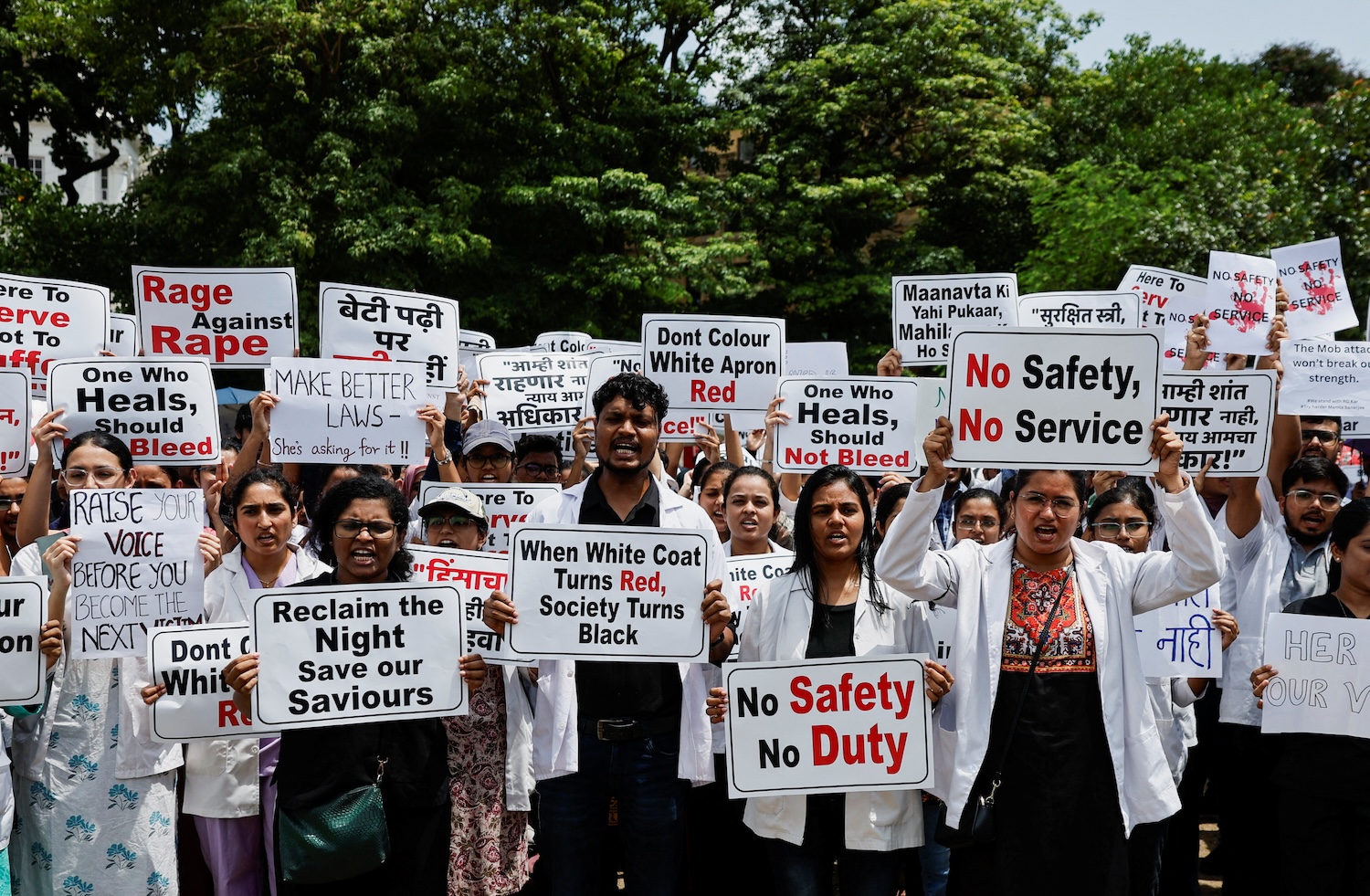
Doctors in India protest the rape and murder of a colleague by going on strike
Medical personnel in Kolkata, India, conducted a 24-hour shutdown on Saturday in protest of the rape and murder of a doctor earlier this month. As a result, hospitals and clinics throughout the country turned away patients, with the exception of emergency cases.
The strike was anticipated to result in the paralysis of medical services in the world’s most populous nation, with over one million physicians expected to participate. Hospitals reported that faculty members from medical colleges had been compelled to provide emergency care.
Following a meeting with representatives of medical associations, the government issued a statement on Saturday urging physicians to resume their public-interest responsibilities. It was stated that the government would establish a committee to recommend measures to enhance the protection of healthcare professionals.
The Indian Medical Association responded by stating that it was currently reviewing the government’s offer. However, it did not terminate the strike, which was scheduled to conclude at 6 a.m. (0030 GMT) on Sunday.
The walk-out was the most recent response to the fatality of a 31-year-old trainee doctor at the medical college in Kolkata, where she was employed, last week.
The crime has incited widespread demonstrations among medical professionals and a public outpouring of fury regarding violence against women, a reaction that is reminiscent of the aftermath of the infamous gang rape and murder of a 23-year-old student on a bus in New Delhi in 2012.
According to the Indian Medical Association (IMA), the strike resulted in the cessation of access to elective medical procedures and outpatient consultations.
According to the ANI news agency, the hospital premises were desolate, and there was a substantial police presence outside Kolkata’s RG Kar Medical College, the location of the woman’s death.
The protests throughout the state have been supported by Mamata Banerjee, the chief minister of West Bengal, which includes Kolkata. Measures to enhance the security of women who work night shifts were announced by her government on Saturday evening. These measures include the establishment of designated rest rooms and secure zones that are monitored by cameras.
Additionally, it requested that private institutions implement measures such as night surveillance to enhance the safety of women in the workplace.
One suspect in the case has been apprehended by India’s Central Bureau of Investigation thus far.
According to a police source in Kolkata, the CBI summoned a number of medical students from the college as part of its investigation. The source also stated that the agency questioned the principal of the hospital on Friday.
Doctors, civil society members, and political leaders led protests in Kolkata throughout the day. Numerous diagnostic centers and private clinics were shuttered.
Dr. Sandip Saha, a private pediatrician in the city, informed Reuters that he would not provide care to patients except in the event of an emergency.
The strike, which is expected to be one of the most significant hospital service shutdowns in recent memory, has attracted the participation of hospitals and clinics in Lucknow, Uttar Pradesh, Ahmedabad, Gujarat, Guwahati, and Chennai, Tamil Nadu.
Patients form lines at hospitals.
Some patients were oblivious that they would not receive medical attention as they waited in line at institutions.
“I have incurred a travel expense of 500 rupees ($6) in order to reach this location.” Local television was informed by an unidentified patient at SCB Medical College Hospital in the city of Cuttack, Odisha, that they are experiencing paralysis and a burning sensation in their feet, cranium, and other regions of their body.
“We were unaware of the strike.” What actions are feasible? It is imperative that we return to our residence.
Raghunath Sahu, 45, who had assembled at SCB Medical College and Hospital in Cuttack, informed Reuters that the physicians had exhausted their daily appointment quota before noon.
“I have transported my grandmother, who is currently in poor health.” Today, they did not encounter her. Sahu stated, “I will have to wait for another day and attempt it again.”
After the 2012 Delhi gang-rape, the Indian government implemented significant reforms to the criminal justice system, including harsher sentences. However, campaigners contend that there has been inadequate progress in preventing violence against women.
In this country, the preponderance of our profession is composed of women. On Friday, IMA President R. V. Asokan stated to Reuters, “We have repeatedly requested their safety.”
The IMA has advocated for additional legal measures to enhance the protection of healthcare workers from violence.
($1 is equivalent to 83.8800 Indian rupees)
All Categories
Recent Posts
Tags
+13162306000
zoneyetu@yahoo.com



